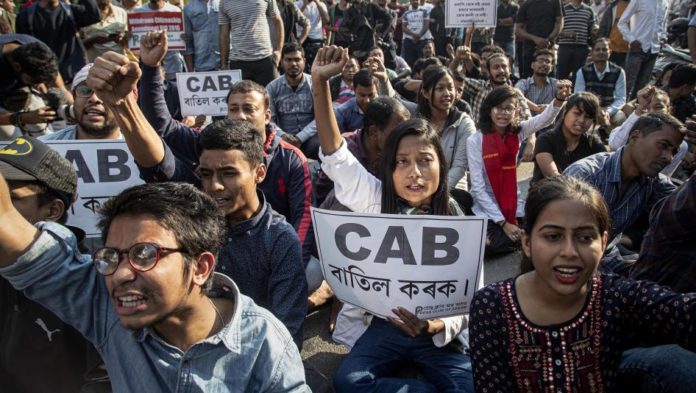By World Desk
India’s Parliament has approved a controversial citizenship bill that grants citizenship to minorities facing persecution from three neighbouring countries – but excludes Muslims, according to media reports.
A day after getting passed by Lok Sabha, the lower house, the Citizenship Amendment Bill was passed on Wednesday by Rajya Sabha, the upper house, with 125 members voting in its favour and 105 against it.
The bill brings sweeping changes to India’s 64-year-old citizenship law by giving citizenship to “persecuted” minorities – Hindus, Sikhs, Buddhists, Jains, Parsis and Christians – from Bangladesh, Afghanistan and Pakistan.
Howver, the legislation put forward by the Hindu nationalist ruling Bharatiya Janata Party (BJP) undermines the country’s secular constitution as opposition parties, minority groups, academics and a US federal panel calls it discriminatory against Muslims.
Several opposition parliamentarians said the bill would be challenged in court.
“The passage of the Citizenship Amendment Bill marks the victory of narrow-minded and bigoted forces over India’s pluralism,” said Sonia Gandhi, leader of the main opposition Congress party.
However, Indian Prime Minister Narendra Modi said it was a “landmark day for India” and the passage of the bill will “alleviate the suffering of many who faced persecution for years”.
Meanwhile,Protests against the bill have spread in various parts of India, including the ethnically diverse northeast, where people fear that undocumented Hindu migrants from neighbouring Bangladesh could be granted citizenship.
In Assam state, thousands of people protested overnight across several towns and cities, some joining processions carrying torches. Police said they used tear gas to beat back protesters in at least two cities.
Faizan Mustafa, an expert on constitutional law and vice chancellor at NALSAR University of Law in Hyderabad, said the bill goes against the country’s constitution.
“It is arbitrary because it’s not based on reasonable classification, it doesn’t have rational objective to achieve, it does not cover all the neighbours, it doesn’t cover all the persecuted minorities,” Mustafa told Al-Jazeera.
“It is constitutionally suspect and legally untenable but let’s see what the Supreme Court does in this case,” Mustafa added.
Modi’s government – re-elected in May this year and under pressure over a slowing economy – said Muslims from Afghanistan, Bangladesh and Pakistan are excluded from the legislation because they do not face discrimination in those countries.
Also left out are other minorities fleeing political or religious persecution elsewhere in the region such as Tamils from Sri Lanka, Rohingya from Myanmar and Tibetans from China.
Many Muslims in India say they have been made to feel like second-class citizens since Modi came to power in 2014.
Several cities perceived to have Islamic-sounding names have been renamed, while some school textbooks have been altered to downplay Muslims’ contributions to India.
In August, Modi’s administration rescinded the partial autonomy of Jammu and Kashmir, India’s only Muslim-majority state, and split it into two union territories.
A citizens’ register in Assam finalised earlier this year left 1.9 million people, many of them Muslims, facing possible statelessness, detention camps and even deportation.















